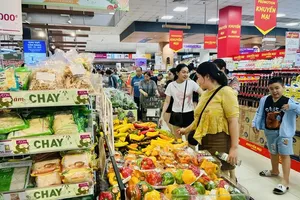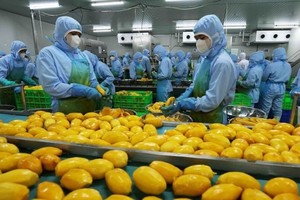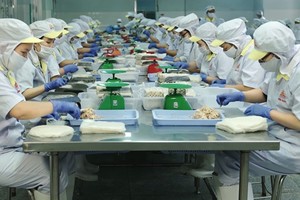 The scene of the talk show (Photo: SGGP)
The scene of the talk show (Photo: SGGP)
Ms. Vu Kim Hanh, Chairwoman of the Business Association of High-Quality Vietnamese Goods, said that the strengths of Vietnam's agricultural economy include spices. Recently, there has been fierce competition between domestic spice manufacturers and multinational companies and imported products.
“This is a competitive market that may not be easy to detect on the surface, but in reality, it is fierce and lively,” Ms. Hanh emphasized.
She cited that the spice market, especially chili sauce, has constantly changed. The product of a company takes the lead, but only a few months later, another company will surpass it. It shows cutthroat competition, as well as the growth of the spice market in Vietnam.
According to market expert Ngo Dinh Dung, CEO of ISM Company, spices are an indispensable ingredient in the modern life of consumers. People like to enjoy delicious dishes and eat more delicately. On the other hand, they prefer convenience.
Therefore, ready-made spices are increasingly popular because consumers prefer the convenience in cooking and eating.
A few years ago, mixed salt products for dipping fruits were not popular, but they are now.
“If we think of seasoning as a ready-made product for each dish, the spice market is huge. Especially for Vietnamese and Asians, their food tastes are very delicate," Mr. Dung explained.
Meanwhile, Ms. Nguyen Thi Van Anh, Director of Tri Viet Phat Trading, Service, and Production Co., Ltd., said that Vietnam exports many raw spices, such as cinnamon, anise, cloves, and cardamom, annually. Up to now, Tri Viet Phat Company has exported many Vietnamese spice products to Japan, the US, and Europe.
Ms. Vu Kim Hanh said that up to now, not only spices but most other Vietnamese products have also not been branded on the global market. Because of no brand, the selling prices cannot match the value.
Therefore, it takes a lot of time and requires all manufacturers to join hands to change this situation.
"If manufacturers know how to join hands with each other, we can promote and build brands for an extremely wide range of products, from spices to agricultural products and export foods," Ms. Hanh suggested.
Ms. Hanh proposed that the State can dedicate a strong team to research spices and give priority order of investment for some spices, for example, support Vietnamese instant noodle, dry food, and instant food companies. This is a huge source of exports.
These products have been facing unreasonable barriers, so the State needs to quickly remove them and have timely support policies for the food industry as well as the spice industry can develop further and penetrate the global market, said Ms. Hanh.
“This is a competitive market that may not be easy to detect on the surface, but in reality, it is fierce and lively,” Ms. Hanh emphasized.
She cited that the spice market, especially chili sauce, has constantly changed. The product of a company takes the lead, but only a few months later, another company will surpass it. It shows cutthroat competition, as well as the growth of the spice market in Vietnam.
According to market expert Ngo Dinh Dung, CEO of ISM Company, spices are an indispensable ingredient in the modern life of consumers. People like to enjoy delicious dishes and eat more delicately. On the other hand, they prefer convenience.
Therefore, ready-made spices are increasingly popular because consumers prefer the convenience in cooking and eating.
A few years ago, mixed salt products for dipping fruits were not popular, but they are now.
“If we think of seasoning as a ready-made product for each dish, the spice market is huge. Especially for Vietnamese and Asians, their food tastes are very delicate," Mr. Dung explained.
Meanwhile, Ms. Nguyen Thi Van Anh, Director of Tri Viet Phat Trading, Service, and Production Co., Ltd., said that Vietnam exports many raw spices, such as cinnamon, anise, cloves, and cardamom, annually. Up to now, Tri Viet Phat Company has exported many Vietnamese spice products to Japan, the US, and Europe.
Ms. Vu Kim Hanh said that up to now, not only spices but most other Vietnamese products have also not been branded on the global market. Because of no brand, the selling prices cannot match the value.
Therefore, it takes a lot of time and requires all manufacturers to join hands to change this situation.
"If manufacturers know how to join hands with each other, we can promote and build brands for an extremely wide range of products, from spices to agricultural products and export foods," Ms. Hanh suggested.
Ms. Hanh proposed that the State can dedicate a strong team to research spices and give priority order of investment for some spices, for example, support Vietnamese instant noodle, dry food, and instant food companies. This is a huge source of exports.
These products have been facing unreasonable barriers, so the State needs to quickly remove them and have timely support policies for the food industry as well as the spice industry can develop further and penetrate the global market, said Ms. Hanh.
























